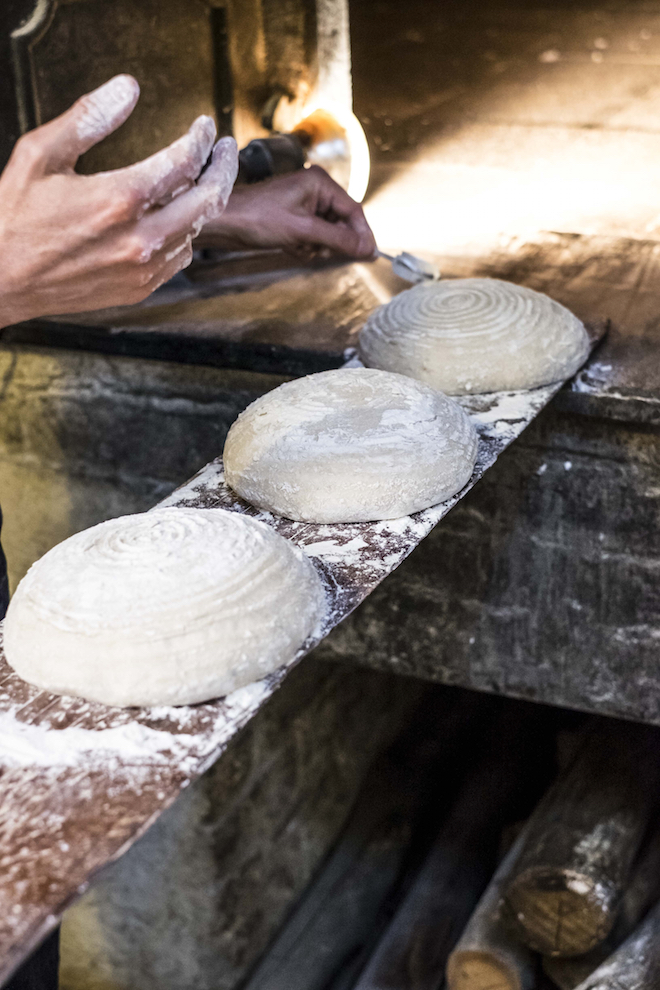
Red Beard Bakery Workshop
For the aspiring baker.
By Jen Curcio
Flour, salt and water produces one of life’s simplest edible pleasures. The ingredients may be simple, and the act of eating it may be effortless, but anyone who has attempted baking bread knows there is no edible pleasure without some pain.
This may sound dramatic or excessive but the art of bread making is a labour of love and like all arts, it takes hours and years of experience to perfect, not to mention frustration in the process. When it comes to sourdough or wild ferment bread, you are at the whim of those ‘wild’ elements, so knowledge, practice and patience to fight back becomes vital.
In a day and age where we can google how to make or do almost anything, it suffices to say that no search can return life experience or instant solutions to an age old practice. I signed up to the Read Beard Bakery Workshop for this very reason. I knew that no article or book I read could teach me the art of baking, particularly a wild ferment loaf. I had so many questions that just weren’t addressed in my reading and attending the workshop opened up a whole new chapter in my baking life. A day long workshop wouldn’t make me a master baker (nowhere near it) but it would help push me gently along with more knowledge and confidence.
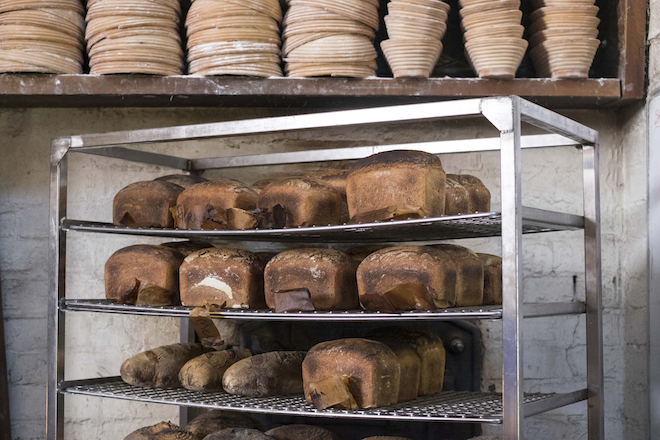 Some of our baking bounty during the workshop
Some of our baking bounty during the workshop
Before attending the workshop I had been experimenting with bread making for about six months. Of all the places and climates, I chose Thailand and wild ferment for this introduction. I had made several botched attempts at sourdough/wild ferment starter, my loaves were flat and wouldn’t rise enough, and the list unfortunately just kept going. In hindsight I am not sure why I didn’t attempt a more basic loaf, which has now become my go-to; but there is something about sourdough or wild ferment loaves. They are without a doubt like everything homemade, the most delicious, and in the case of bread – the holy grail of loaves. And the bi-product apart from lots of sourdough/wild ferment starter, is a culture of stubborn home bakers, like me.
When I arrived in Trentham for the workshop late last year (2016), I was surrounded by a mixed group of aspiring bakers. Apart from our passion for baking, our other common tie was our commitment to persisting with a hobby that so far had not really liked us as much as we liked it. As we sat around the table clutching our coffees, and nibbling nice buns just out of the Scotch oven (the most delicious baked treats from Red Beard); we introduced ourselves and why we were doing the course. After we’d rattled off our names, a domino effect ensued – it was like we were suddenly in group therapy for bakers.
Sharing our experiences making starter culture or our failed attempts at baking a perfect loaf, nods of agreement and looks of honest empathy crept across our faces. One man’s loaves were ok but looked like space ships, another man’s wife had sent him to do the course in the hope that he would start baking for her, others were having trouble with their starter (poolish or levain). The stories varied but for most of us the crux of being there was admitting our problem: that we could not successfully make a whole loaf of wild ferment/sourdough bread. And it was then, after our verbal bread confessions that we migrated to the bread room to confront our fears, and knead away our bad bread making habits.
Under the instruction of Red Beard Bakery owner and master baker, John Reid, in our full day workshop he guided us through the basic principles of making wild ferment bread. This covered kneading, shaping, proving, how to start our own levain from scratch (and I am pleased to report it was successful!), and even retrofitting our ovens and of course baking our own loaves.
Unfortunately for me, creating a levain in a hot climate like Thailand is not possible for many reasons, so I will have to save my wild ferment baking for a colder climate. John’s expertise and tips however, proved very helpful for general baking (even with active dry yeast). You can buy a book, or scroll through the internet for hours but I cannot recommend John’s course highly enough. He was incredibly generous with his knowledge-sharing, and patient with our questions.
The pain of baking may not go away completely but somehow the taste of your own freshly baked bread (in a Scotch oven no less!) will provide you with the hope, pleasure and encouragement to persevere. In the meantime, see images from the Red Beard Bakery Workshop below, along with some tips and other key learnings from the day.
 Our work station for the day
Our work station for the day
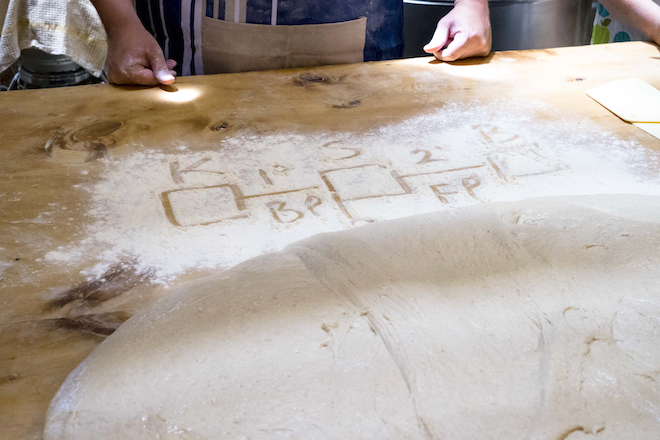 John explaining the bread making process on the bread board
John explaining the bread making process on the bread board
TIPS
- John says that a loaf mixture needs water. A dry mixture will yield a dry/hard loaf. Persevere even though your mixture will be sticky. If the dough is coming off too easily from the fingers then it is not wet enough.
- Dry clean your fingers with a small amount of dry flour throughout the bread making process. Set aside a bowl to collect the dry cleaned flour, as well as flour/dough scraps with a dough scraper. These go straight into compost and can save you a lot of water washing your fingers.
- Your proved loaf is ready when it has started to rise not when it doubles in size.
- Make a new levain/starter every 6 months to boost diversity.
- Invest in a home mill (or make friends with a baker) to ensure you are using the freshest flour. Stone-milled flour must be used within 5-6 weeks otherwise it goes rancid.
- If you’ve had a break from feeding your starter make sure it’s for no less than 72 hours otherwise fungi will start growing.
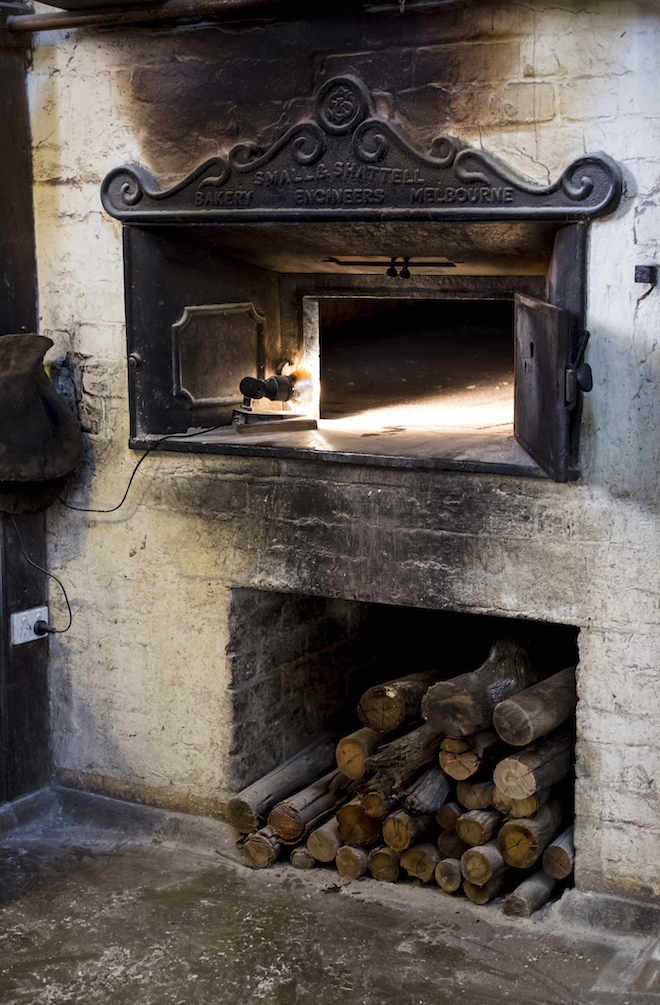 The gorgeous Red Beard Bakery Scotch oven, roughly 125 years old
The gorgeous Red Beard Bakery Scotch oven, roughly 125 years old
 The gorgeous strips of Belgian linen used to prove the Pagnotta loaves
The gorgeous strips of Belgian linen used to prove the Pagnotta loaves
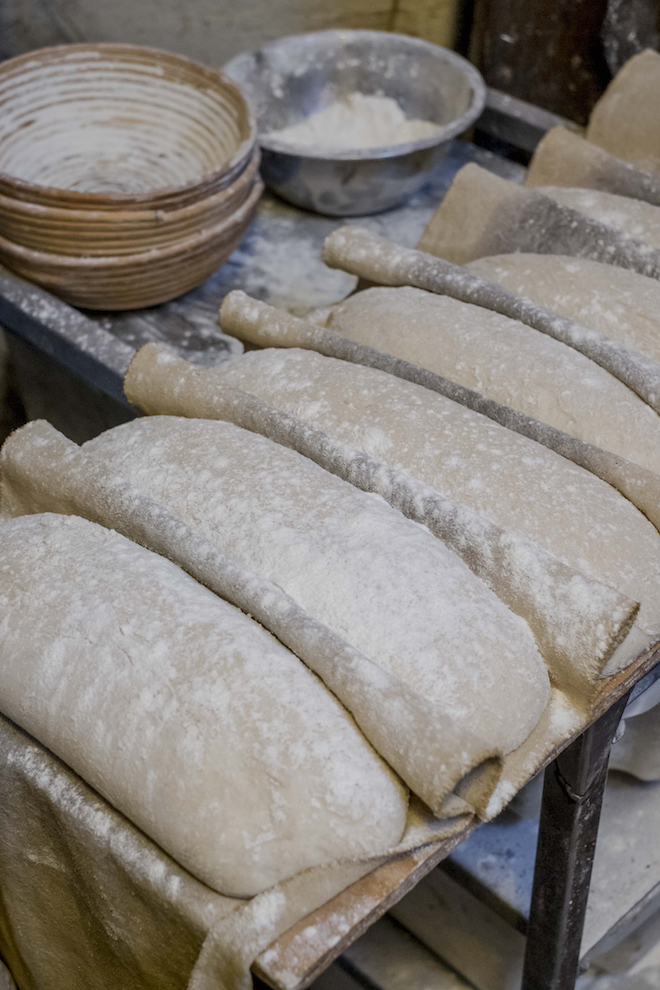 Pagnotta loaves proving
Pagnotta loaves proving
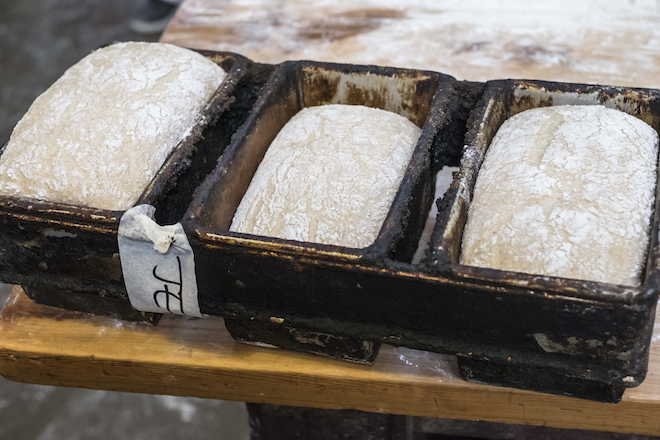 My loaves in the triple bread tin
My loaves in the triple bread tin
MISCONCEPTIONS
- Dough temperature while proving. The aim while proving is to set the temperature of the dough, and not to raise it.
- Using electric kneaders. They can over-knead, if you knead by hand you can’t.
- Kneading for more than five minutes. According to John, five minutes of kneading will create 95% of the gluten creation you need.
- Levain/starters require filtered water. Use tap water, it will create a ‘survivor levain’ as John says. The diversity of microbes equals flavour.
- Ceramic or stainless steel bowls for placing the dough. According to John, the ideal vessel is actually a wooden bowl with a lid.
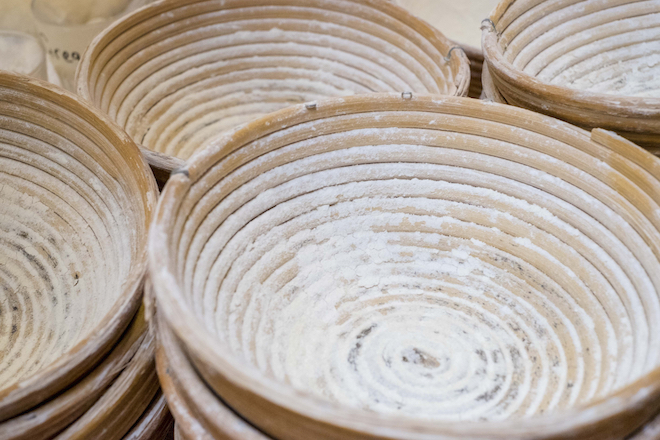 Willow proving baskets for the Cobb loaves
Willow proving baskets for the Cobb loaves
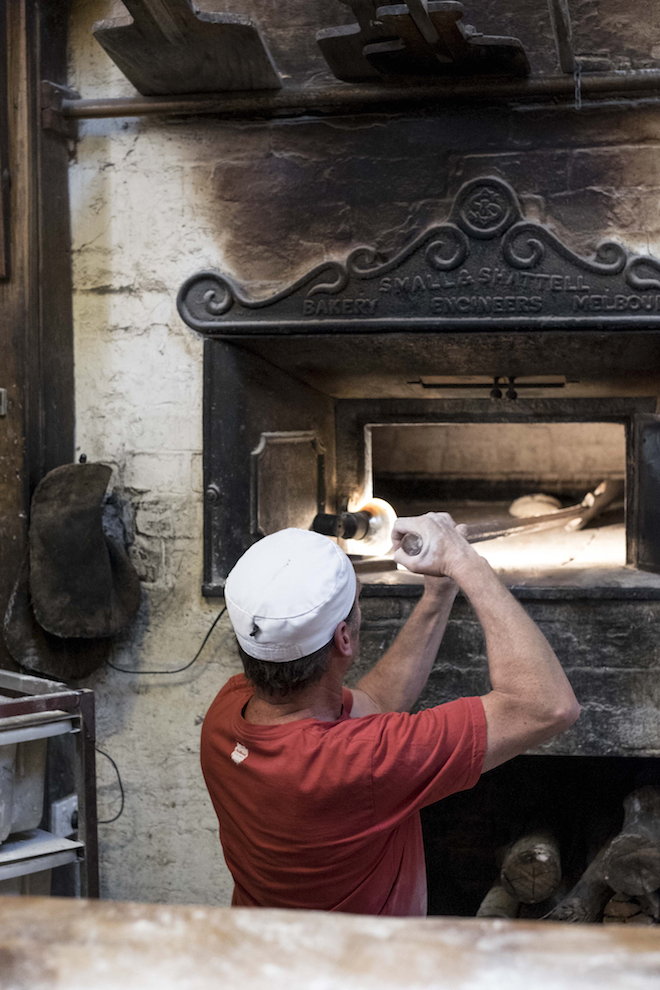 John using a paddle to place the bread loaves for baking inside the scorching hot Scotch oven
John using a paddle to place the bread loaves for baking inside the scorching hot Scotch oven
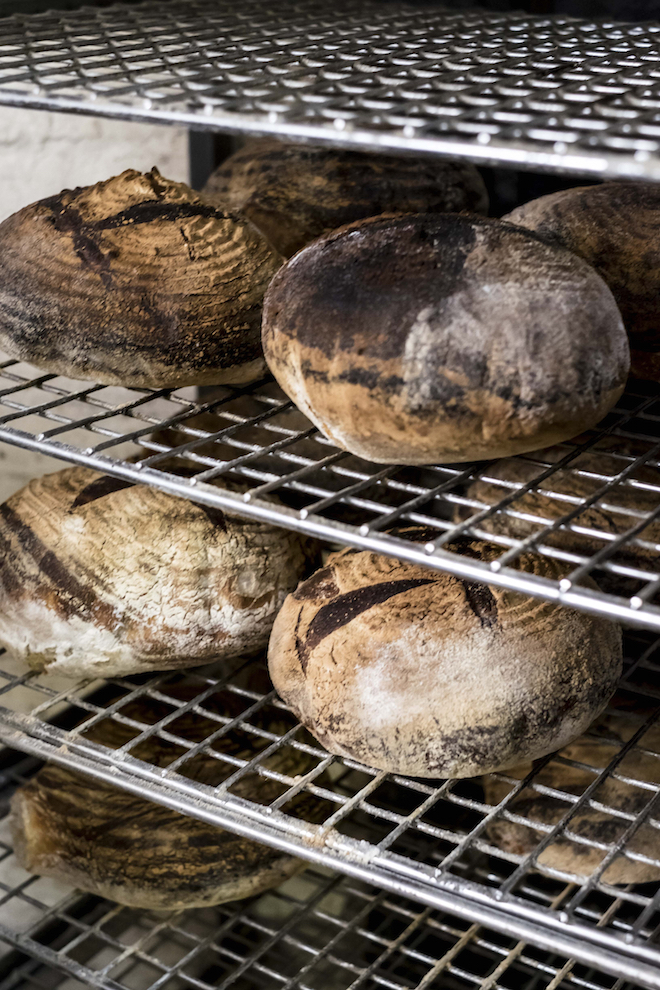 Some of our loaves fresh out of the Red Beard Scotch oven
Some of our loaves fresh out of the Red Beard Scotch oven
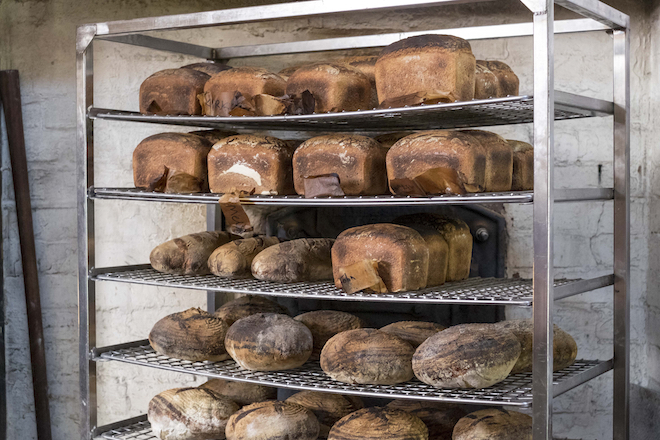 All our loaves from a full day of work!
All our loaves from a full day of work!
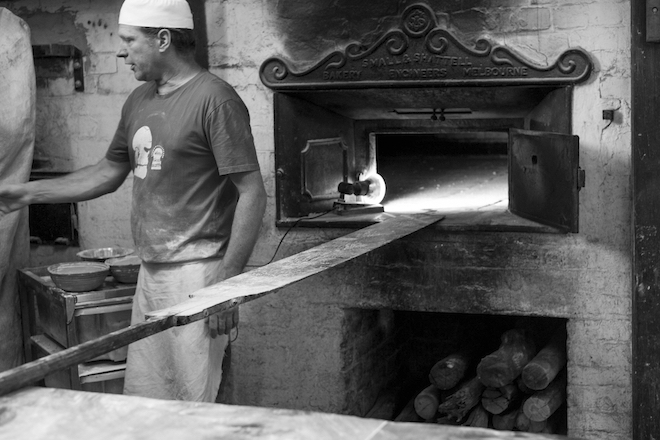 John Reid of Red Beard Bakery
John Reid of Red Beard Bakery
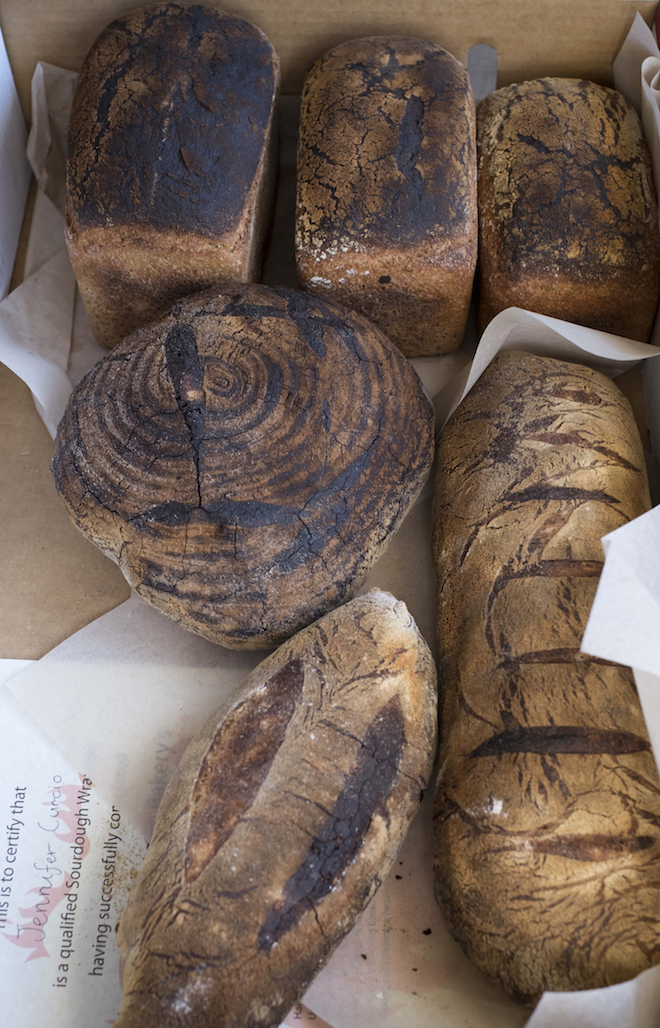 Each of us got to take home all the beautiful loaves we’d made (and then some).
Each of us got to take home all the beautiful loaves we’d made (and then some).
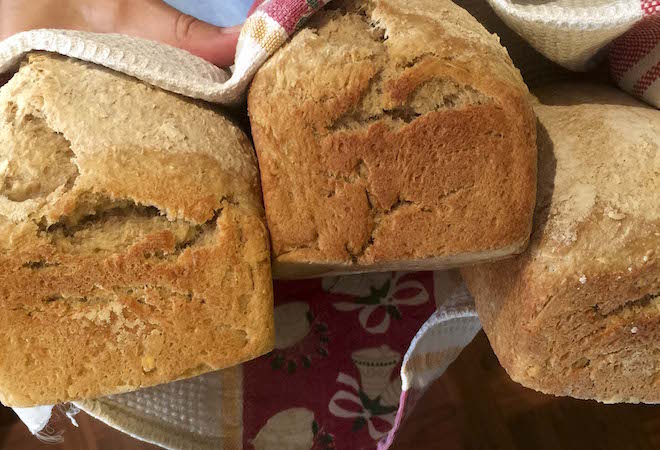 The loaves I baked at home (in Melbourne) using the starter we’d cultivated at Red Beard
The loaves I baked at home (in Melbourne) using the starter we’d cultivated at Red Beard
Website: Red Beard Bakery
Trading Hours: Friday – Monday 8am – 5pm
Address: 38A High Street, Trentham, Victoria
Phone: (03) 5424 1002
Facebook: Red Beard Historic Bakery
Notes: Workshop bookings via Trentham Neighbourhood Centre on (03) 5424 1354, or
admin@trenthamnc.org.au









